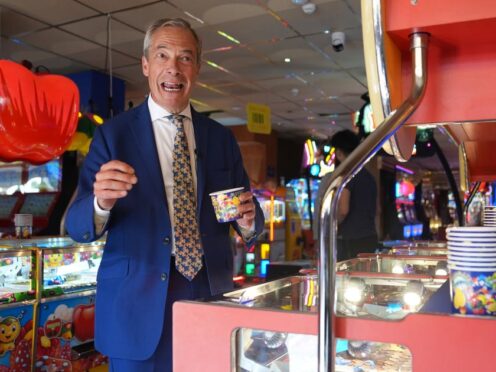James Cleverly accused Nigel Farage of “victim blaming of the worst order” for suggesting the West provoked Vladimir Putin’s invasion of Ukraine.
Reform UK leader Mr Farage said he was not an “apologist” for the Russian president, but “what I have been saying for the past 10 years is that the West has played into Putin’s hands, giving him the excuse to do what he wanted to do anyway”.
Home Secretary Mr Cleverly said it was “completely wrong” for a British politician to be “echoing” Mr Putin’s justification for the war.

He told GB News: “There is a strong track record of Western leaders and Western countries trying to bring Russia into the fold as it were, to try and show Russia and Russians that there was a peaceful, prosperous future for them.
“Time and time again now we’ve seen Putin reject the peaceful, more prosperous options and he’s waged conflict in Ukraine, Russian troops in Georgia, Russian troops in other countries around eastern Europe.
“To suggest somehow that those countries brought it upon themselves, I think, is victim blaming of the worst order.”
In a BBC interview, Mr Farage claimed “we provoked this war”, while drawing a link between Nato and European Union expansion in recent decades and the conflict in eastern Europe.
He doubled down on his position in an article in the Sunday Telegraph, writing: “Don’t blame me for telling the truth about Vladimir Putin’s war in Ukraine. Facing up to the facts about the mistakes of the past has to be the first step towards the peaceful future we all want to see.”
He added: “I am not and never have been an apologist or supporter of Putin. His invasion of Ukraine was immoral, outrageous and indefensible.”
But, he added: “Back in 2014, when the EU first offered Ukraine an accession agreement, I said in a speech in the European Parliament that ‘there will be a war in Ukraine’. Why? Because the expansion of Nato and the European Union was giving Putin a pretext he would not ignore.
“If you poke the Russian bear with a stick, don’t be surprised if he responds. And if you have neither the means nor the political will to face him down, poking a bear is not good policy.”
This is nauseating ahistorical drivel and more Kremlin propaganda. Nobody provoked Putin. Nobody “poked the bear with a stick”. The people of Ukraine voted overwhelmingly in 1991 to be a sovereign and independent country. They were perfectly entitled to seek both NATO and EU…
— Boris Johnson (@BorisJohnson) June 23, 2024
Former prime minister Boris Johnson, who has championed support for Ukraine, said: “Nobody provoked Putin. Nobody ‘poked the bear with a stick’.
“The people of Ukraine voted overwhelmingly in 1991 to be a sovereign and independent country.
“They were perfectly entitled to seek both NATO and EU membership. There is only one person responsible for Russian aggression against Ukraine – both in 2014 and 2022 – and that is Putin.
“To try to spread the blame is morally repugnant and parroting Putin’s lies.”
